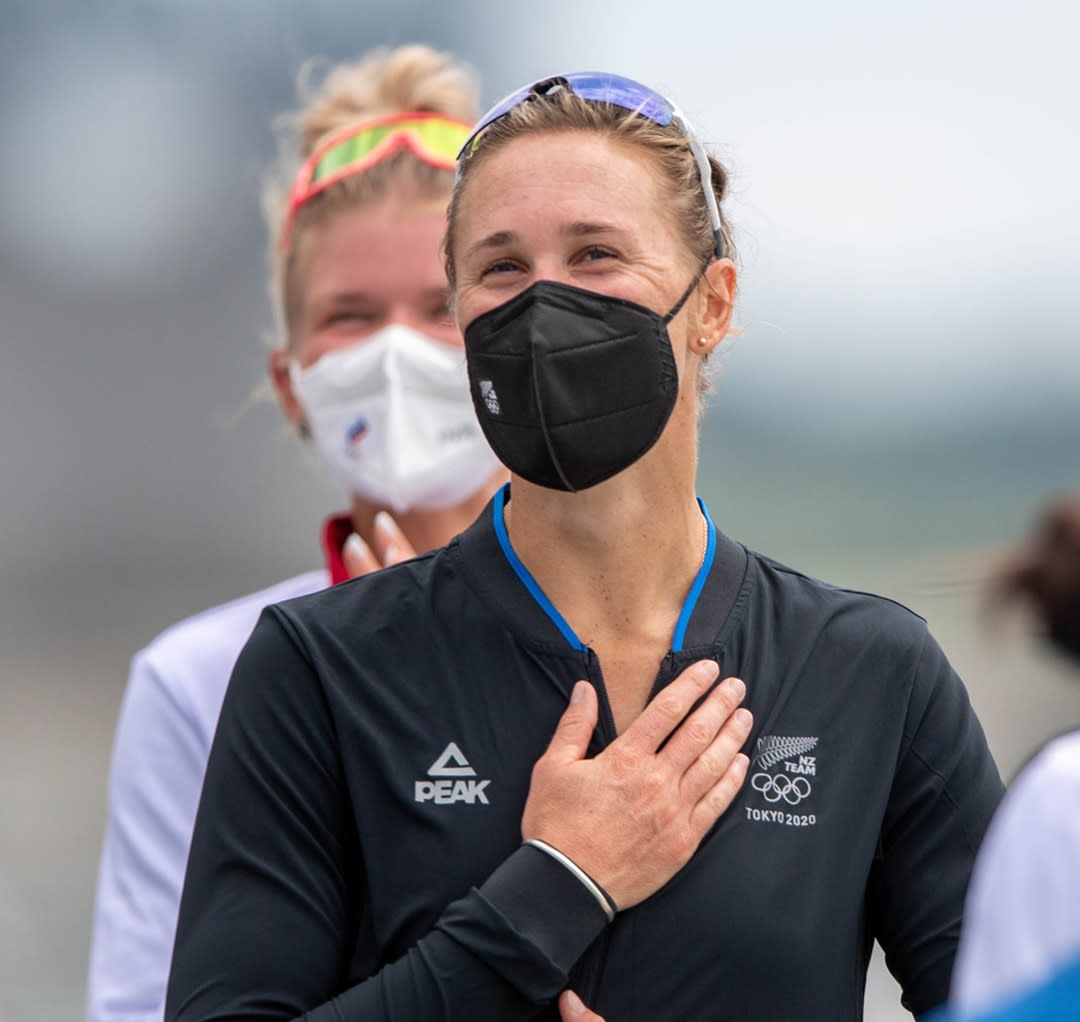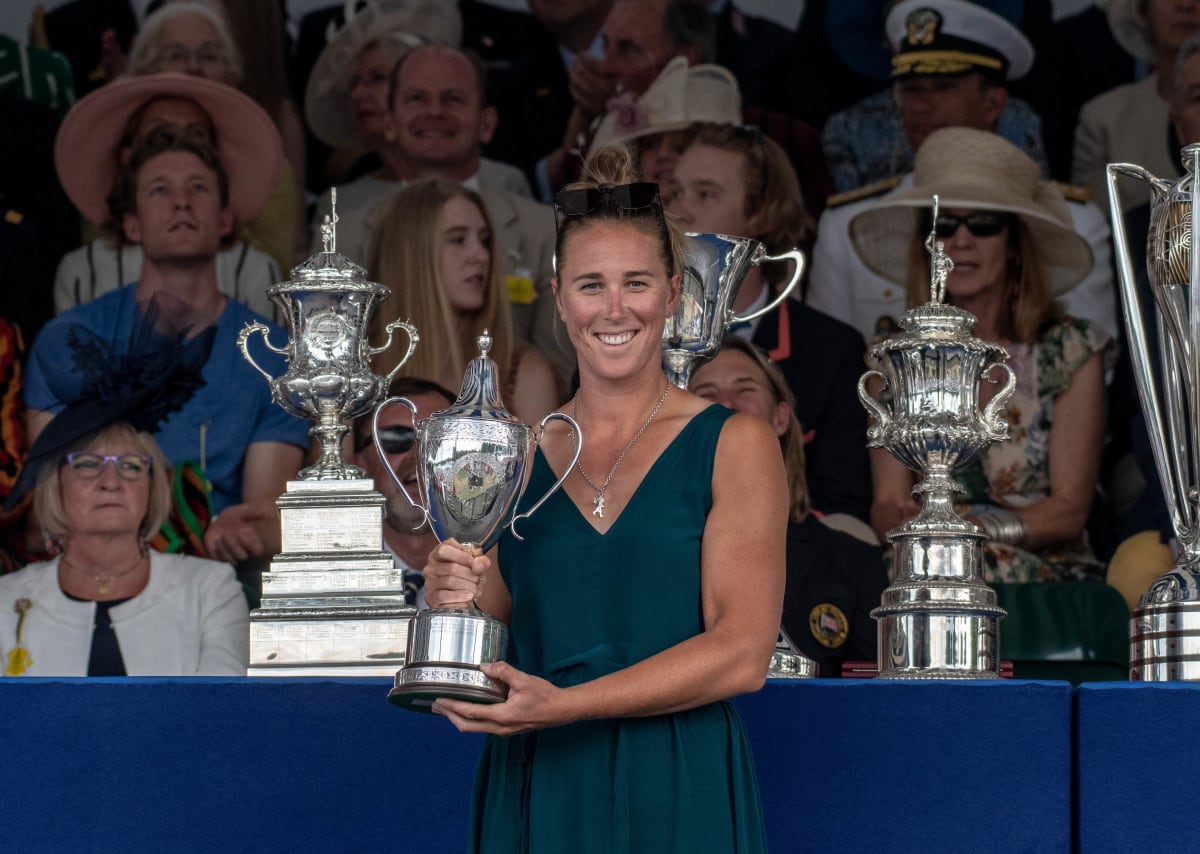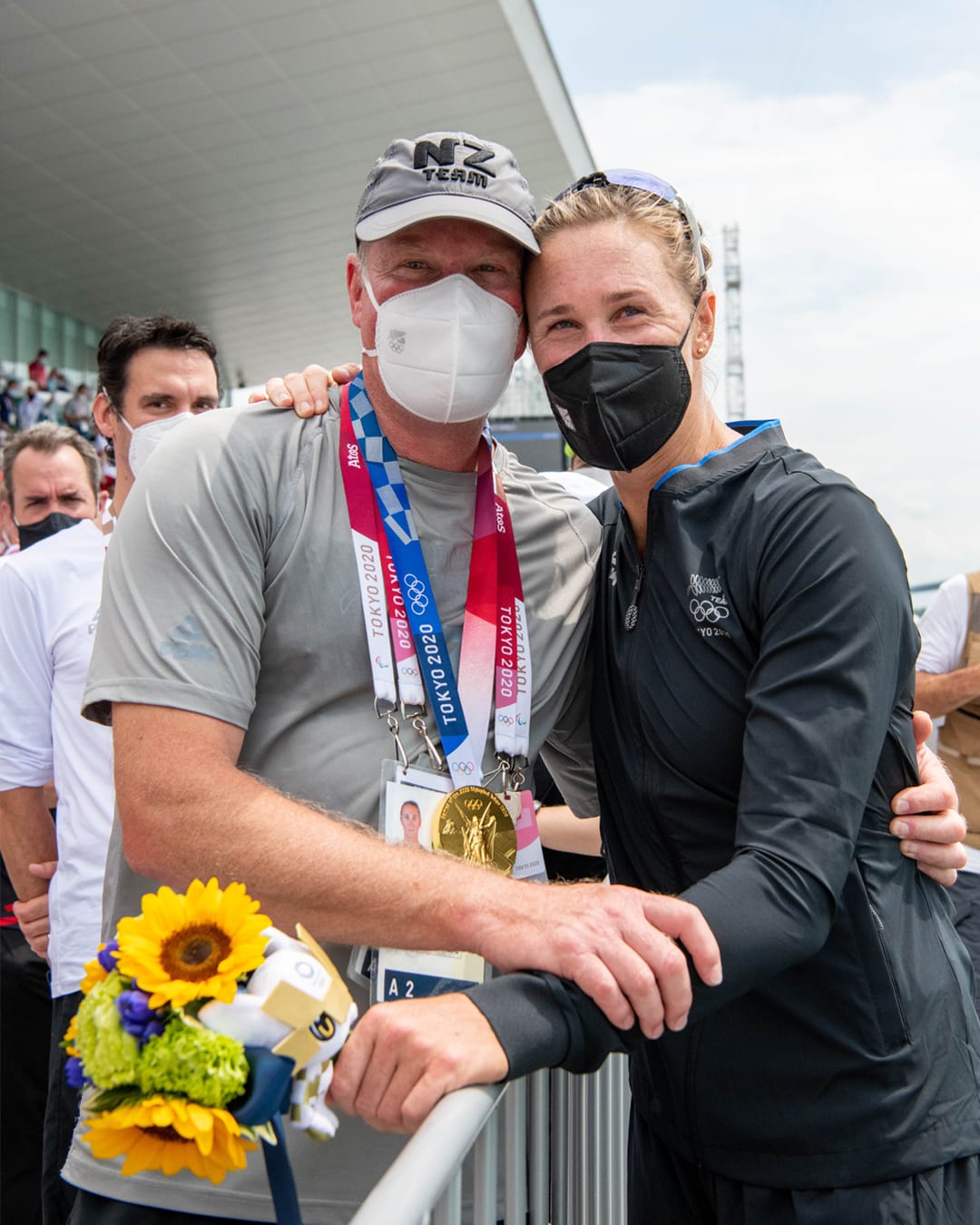
Tokyo gold medallist Emma Twigg has committed to another year of elite rowing, with an eye to competing at her fifth Olympics. But, she tells Suzanne McFadden, playing cricket and becoming a mum have given her a view of the future.
Even after dabbling in a little cricket this summer, and spending time facing White Fern captain Sophie Devine in the nets, Emma Twigg isn’t ready to leave rowing yet.
If anything, the short time she’s spent in Northern Districts colours playing cricket this year – picking up a bat for the first time in 22 years – has only revitalised the Olympic champion.
Twigg has decided to row at the highest level for at least another year, including the world championships in September, and to work with her team of high performance experts on a three-year plan to the 2024 Paris Olympics.
“I’ve spent 20 years trying to be an Olympic champion, so I feel like this is the time to enjoy the sport even more,” the 34-year-old Twigg says.
And this time will be different. Twigg is about to become a mum for the first time – her wife, Charlotte, is expecting their son in April.
“I’m well aware my life is going to change, and there will be quite a shift in focus,” Twigg says. “But that’s why it’s cool to have some flexibility. I’m well and truly committed to rowing this year, but if I get two or three months into it and decide being a mum is more important than being a fulltime athlete, then I can make those decisions, too.”
It’s six months since Twigg won OIympic single sculls gold in Tokyo, in her fourth attempt, and she’s back on Lake Karapiro rowing 20km every morning. “It’s my sanctuary,” she says.
But she’s tried to spend her afternoons involved in other things: spending time with friends and family, hiking up hills, doing boxing training and playing cricket.
She turned out for Northern Districts A in two T20 games this month, and was the surprise 12th man for the Northern Brave in their last game of the Super Smash season on Monday.
The Northern Districts A side featuring Olympic rowing champion Emma Twigg (back row, fourth from left)
The Twiggs had flown to Wellington to watch the match – Charlotte Twigg is the commercial manager for Northern Districts Cricket - when New Zealand moved into red light Covid restrictions. “We thought ‘Damn, we can’t go to the game now,’” says Twigg.
“Then at 8pm I got a call from the Brave’s coach, Jo Broadbent, saying ‘Are you keen to be the 12th man, because we’ve had two injuries?’”
Twigg spent most of the game carrying drinks onto the field, “which is bloody good fun,” she says. “You’re right in the action, and able to give the girls a pep talk.
“But with three balls left in the [Wellington Blaze] innings, someone got injured and I had to go out and field.”
After the game, Devine invited Twigg into the nets to face her bowling. Twigg couldn’t say no. “I took some of the girls from the ND team and Sophie had a good yarn with them. It was a great day,” she says.
Growing up, Twigg played cricket until she was 12. “But not well, I didn’t love it. I remember being bored,” she laughs.
But it was Charlotte (nee Mizzi), who once played wicketkeeper for Wellington, who reintroduced her to the game.
“I just love going to the nets and having a hit, which is completely different to playing a game. Anyone can stand in the nets and hit a ball,” Twigg says.
“But I got involved with the ND girls there, and Jo [Broadbent] invited me onto the bench this summer. I got to wear the team kit and do the warm-ups. Then they put me in the academy as a test run.
“But honestly, I now know the skill required to play at the top level, and what you’ve got to commit to that. And while I’m still rowing, it’s not feasible.
“Being around the other girls you realise they’ve had 10 to 15 years of game experience and knew all the intricacies of the game. But it’s been fun – a nice distraction.”

Twigg says she discovered she’s “neither good at batting or bowling”, although her preference is to bat. “I have these grand visions of being able to hit the ball like Sophie Devine. High expectations – then you realise actually how hard it is,” she says.
“I definitely have power; I can really hit when I connect. But it’s so complex.”
While she faced Devine in the nets, Wellington Blaze captain Maddy Green offered Twigg some pointers. “For a non-cricketer to step towards a ball that’s coming at you at a rate of knots, it's quite a skill and takes a bit of courage,” Twigg admits.
Her wife is a good coach, she says, “but I tend not to listen to her as much as I do the others.”
The cricketing experience, Twigg says, has been more about being involved in a different sporting environment.
“I’m a single sculler within a wider team, but it’s not a team sport, per se. It’s been really interesting feeling out the dynamics of personalities in a cricket team and how everyone interacts,” she says.
“Long-term, it’s something that really interests me. From a performance level, how you get the best out of people – I think it’s fascinating, which I’ve loved.”

Twigg had always said she would continue to compete for another year after the 2020 Tokyo Games – which were, of course, delayed by the global pandemic. “In my mind I was thinking that’s okay, because I was always going to row another year,” she says.
But it was all Twigg learned during her two-year ‘retirement’ from the sport after Rio (having finished fourth for a second straight Olympics) that brought her back to the lake.
“I guess it’s about do I still love what I do? Do I still have the motivation to train? All the things I learned in those years in retirement are even more relevant now,” she says.
“It solidifies in my mind the reasons to be involved in sport. It’s not necessarily about the glory, it’s about the day-to-day, and if you’re not loving that, there’s a reason not to be doing it.
“If my body and my mind are still able… I’m a long-time retired.”
This time.
Her two years out of the boat – some of it spent behind a desk at the International Olympic Committee in Lausanne - made Twigg appreciate the privilege of being an elite athlete. And she used it to best effect in her victorious Tokyo campaign.
“To have a sole focus, and an amazing team of people around me who work day-in, day-out selflessly for me, is a pretty unique thing to be part of,” she says.
It was one of her “non-negotiables” when she returned to elite rowing - that she could assemble a team of high performance experts around her. “I wanted to make sure whoever my coach was, they were willing to seek information and learn from others,” Twigg says. “A coach is very technical, but he’s never going to be a specialist in psychology or nutrition.”
And that’s what her coach, Mike Rodger, did to help Twigg achieve her career-long goal.

She pulled in Angus Ross to do Twigg’s strength and conditioning, John Quinn for mental skills, Caroline MacManus for physiology, Justin Evans for biomechanics, Christel Dunshea-Mooij for nutrition and Melissa Gilbertson for physiotherapy.
“It even goes to the extent of my weekly massage therapist, Seah Taylor – without her, I wouldn’t have been in one piece,” she says.
“This campaign more so than the rest made me realise how important each individual was. It sounds a lot of people for one person - and there’s a fine line between too many cooks. But everyone in the team knew what their role was, and every single one of them contributed at some time in the campaign.”
Twigg believes that was the difference between missing out on the podium at three Olympics and standing on the highest step at last year’s Games.
“It was pretty epic to create a team where everyone was on the same page, but able to challenge each other to help me go as fast as I possibly could. I had to commit to their ideas as well. I feel very lucky we have a system that allows that support,” she says.
“Without that detail, my previous campaigns show that with little holes you don’t get the result that you want.
“I sat on the start-line in Tokyo and thought there was nothing I would have done differently. It didn’t matter the result that was to come, I could be really proud of that lead-up and the team I had around me.”
The team have reassembled and already held a few meetings. While they’ve kept the same mentality, Covid continues to “move the goalposts” on what rowing’s international calendar will look like this year.
Nevertheless, they’re working on a three-year plan.
“If I’m here now, it’s got to be about being there in Paris in 2024 as well,” Twigg says.
“We have highlighted a plan working back from Paris. And if I make it there, it’s a success. But if not, you have to make sure you’re enjoying it year-by-year, and adding bits of random things into my life in this non-Olympic year is actually really important, because it keeps things fresh.”
Like becoming a parent.
“We’re pumped. We’re good to go,” Twigg says.
The timing of their baby’s arrival has worked out “quite well” for Twigg’s rowing return. Rowing NZ is looking to send a team to the series of World Cups starting in Belgrade in May, before the world championships in the Czech Republic in September.
Twigg won’t be available for the World Cups, but wants to row at the world champs.
“I want to become accustomed to being a mum and all that involves, and to spend some quality time with him when he’s brand new,” she says. “I feel like I’ve struck it lucky in that regard. You can sharpen the bow as you head towards Paris.”
Twigg hopes her wife and son will be able to travel with her to Europe and then continue on to the United States, to contest the races Twigg and Olympic gold medallist Mahé Drysdale have traditionally raced – the Head of the Charles Regatta and the Philadelphia Gold Challenge Cup.
“Part of the reason for my return was I wanted Char to experience the fun side of rowing as well,” Twigg says.
Her cricketing foray has made Twigg certain she wants to continue to be engaged in sport well after her rowing days are complete.
“My heart is where the action is,” she says.
Her time with the IOC – including working at the 2018 Pyeongchang Winter Olympics – made her realise administration probably isn’t her gig.
“But this little stint has reiterated that I’d really like to be as close to the athletes as possible. It’s just figuring out a role where I can have an impact on young athletes, whether it’s as a high performance manager or whatever,” says Twigg, who spent some time this summer coaching young rowers at St Peter’s School in Cambridge.
“I’d love to stay involved in sport – but probably not rowing initially. You learn so much from others in an environment you don’t know.
“If I can find a job where I am as equally passionate as I am getting up and going rowing 20km in the morning, then that would be a win.”







